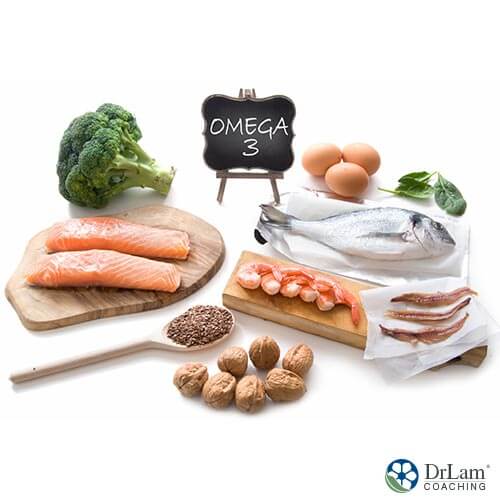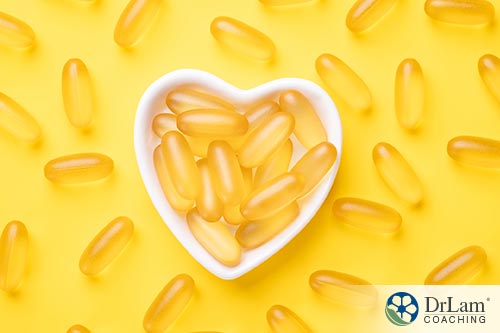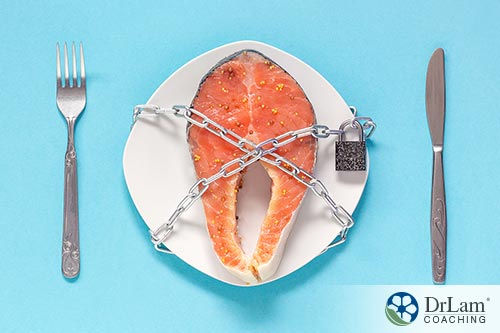 You’ve heard that omega 3 fatty acids are important nutrients, and you may even be supplementing with them. But did you know that not all forms of omega 3 are created equal? There are many food sources of omega 3s, and some of their benefits actually come from their balance with omega 6 fatty acids. Furthermore, while omega 3s have several important benefits for your body, research doesn't necessarily support taking them in supplement form. We'll discuss the best ways to get the benefits of this important nutrient.
You’ve heard that omega 3 fatty acids are important nutrients, and you may even be supplementing with them. But did you know that not all forms of omega 3 are created equal? There are many food sources of omega 3s, and some of their benefits actually come from their balance with omega 6 fatty acids. Furthermore, while omega 3s have several important benefits for your body, research doesn't necessarily support taking them in supplement form. We'll discuss the best ways to get the benefits of this important nutrient.
Some types of omega 3 fatty acids are essential fats. Whenever we talk about something being “essential” in the field of nutrition, it means that your body can’t make it on its own. You have to get it from external sources, either through food or supplementation. From food, the main sources are fish and other kinds of seafood, though there are some plant sources as well.
Although there are many different types of omega 3s, three types are well-documented scientifically. They are:
For healthy adults, an adequate daily intake of ALAs, which are the essential type of omega 3s, is 1.6 g for men, 1.1 g for women, 1.4 g for pregnant women, and 1.3 g for breastfeeding women.
But even though your liver can convert ALA to EPA and DHA, it is a very limited process that doesn’t result in sufficient amounts. Therefore, you also should get your EPAs and DHAs through food as well. The general recommended minimum of combined EPA and DHA per day is 250-500 mg. That equates to eating fish about twice a week.
The best way to get these fatty acids is through food.
Foods rich in omega 3s include:

Foods rich in omega 6s include:
Your daily intake of omega 3s should actually be relative to your intake of omega 6 fatty acids. Omega 3s and omega 6s constitute the two main classes of polyunsaturated acids. For optimal health, you need a balance between the two. But, unfortunately, modern diets are far higher in omega 6s than they are in omega 3s, which can cause some problems.
In fact, there are healthcare professionals that believe an unbalanced ratio of intake of the two is one of the underlying factors in many chronic conditions, particularly cardiovascular problems and cancer. But it is difficult to pinpoint an exact healthy ratio, and there are variations between individuals. Also, testing for the levels of either can be misleading. First of all, you’d be testing serum levels, which depend on the most recent meal a person has had. Secondly, no one can say what the optimal range of these levels should be.
That’s why most healthcare professionals don’t test for the levels of either, so we need an approach that is a little less complicated. And that approach is simple: look at your diet to see what your average intake of food sources of each is like. If you’re eating more omega 6 rich foods, as most people in the U.S. are, then you need to increase your intake of omega 3s.
Aiming for a balance between the two doesn’t mean you should cut down on omega 6s. They’re actually healthy for you and carry out important functions in your body. All it means is that you should try to increase your omega 3 intake. This can be done through food or supplementation.
 In general, we advise our adrenal fatigue clients to focus more on fixing their diet first, then fill in any nutritional gaps with supplements.
In general, we advise our adrenal fatigue clients to focus more on fixing their diet first, then fill in any nutritional gaps with supplements.
That’s why we recommend eating wild-caught fatty fish, such as salmon, at least twice a week. This not only helps you get more omega 3 fatty acids into your diet, but it also gives you a huge nutritional bang for your buck.
First of all, healthy protein will keep you satiated for longer without spiking your blood sugar levels. Secondly, it contains other essential nutrients, such as vitamin B12, that are important for your health.
Of course, not everyone wants to eat fish weekly or even at all. Also, in some cases, you may have a need for higher doses than what your diet could provide. For example, if you have high triglyceride levels or heart disease, you may need a dose two to four times higher than the daily adequate intake outlined above. In such cases, a supplement might help.
Higher doses in supplements are what we refer to as therapeutic doses. And they are usually only used for shorter periods of time. You also have to be careful if you are an adrenal fatigue sufferer, as they can cause paradoxical reactions and even adrenal crashes.
Adrenal Fatigue Syndrome (AFS) is a condition you can get after enduring chronic stress. Chronic stress puts a lot of pressure on your adrenal glands to produce cortisol, which is your body’s main stress hormone. After some time, your adrenals get so overworked that they become weak and their cortisol levels drop.
Symptoms of AFS include fatigue, sleep problems, weight gain, brain fog, anxiety, mild depression, hair loss, dry skin, loss of libido, PMS, infertility, hypoglycemia, salt and sugar cravings, lowered immunity, food and drug sensitivities, heart palpitations, blood pressure instability, and an inability to handle stress.
The reason symptoms are so varied is that your adrenals are part of a larger network of organs and systems that work together to fight stress, the NeuroEndoMetabolic (NEM) Stress Response. When one part of your NEM is affected, it affects all the rest. These include the Hormone, Bioenergetics, Cardionomic, Neuroaffect, Inflammation, and Detoxification circuits. Each circuit is composed of different, related components, such as the adrenal glands and the thyroid, or the gut and the immune system. So when the adrenals are affected, some of these other components weaken as well and you develop symptoms.
If you have a deficiency of omega 3 fatty acids, it causes physical stress. And because omega 3s are important for the health of your cardiovascular system, your nervous system, and your inflammation response, then you can see the related circuits begin to slow down and even dysregulate. That can then cause even more stress on your adrenals, creating a cycle of deterioration.
Increasing your intake of omega 3s is not only good if you have a deficiency. It can also:

Supplements can potentially backfire if you have more advanced AFS and a weakened NEM. You could end up with a paradoxical reaction, which is a reaction opposite of the benefits you expected to gain from the supplement. Or you could end up with an adrenal crash.
Still, gentle supplements are part of almost every recovery protocol we create for our clients. And they can be especially useful at the beginning of your recovery journey to give you the extra boost you need. They can also help you get over some of the common recovery slumps that you could experience.
When it comes to omega 3 fatty acids, supplementation is a hit or miss. First of all, the research on the topic has had mixed results. Reviews of several studies didn’t show strong evidence to support the use of supplements for heart health. However, there is quite a large amount of evidence supporting the intake of fish as a good source of omega 3s and its beneficial effects on the cardiovascular system. Evidence for the benefits of supplementing for the other conditions listed above is even less than that for cardiovascular health.
Still, because some people may not want or be able to increase their seafood intake, it may be worthwhile to try a supplement. But it's always a good idea to do so with the help of a healthcare professional. This is especially the case if you are pregnant or breastfeeding, or if you take medications that affect blood clotting. Also, keep in mind that many omega 3 supplements contain fish, so if you’re allergic to seafood, you’ll want to avoid those and seek out the plant-based ones.
 Generally, it's best to get your nutrients from food, but some foods come with possible issues.
Generally, it's best to get your nutrients from food, but some foods come with possible issues.
With fish, some types are higher in mercury than others. These include tilefish, albacore tuna, king mackerel, swordfish, and shark. If you’re pregnant or nursing, you should avoid these altogether. Otherwise, limiting them to once in a while is okay.
Also, farm-raised fish may also have been given antibiotics, which can end up in your system as well.
Some omega 3 fortified foods might also contain other ingredients that are not the healthiest for you, especially if you’re trying to recover from adrenal fatigue.
Again, if you’re unsure about any of the above, the best thing to do is to consult your healthcare professional and make sure they know your condition, needs, and goals. If you have AFS, you should be following the guidance of an expert coach.
Omega 3 fatty acids are an essential nutrient that you need to get from food. Fatty, cold-water fish is one of the best sources, although there are some plant-based sources as well. Omega 3s are important for cardiovascular health, brain health, eye health, and reducing inflammation. They can also be an important part of adrenal fatigue recovery.
Supplements might be useful in certain circumstances. For example, perhaps you’re deficient and you can’t increase your dietary intake too much. Or perhaps you can’t eat fish at all. Although research hasn’t shown strong evidence to support the use of supplements, it still makes sense to use them if you’re not getting any from food. But be sure to talk to a doctor first if you have AFS or other health conditions.
Omega 3 Fatty Acids are essential nutrients your body needs to function. They’re especially beneficial for your cardiovascular system, your brain, and your eyes. They may also be useful for adrenal fatigue recovery. But their effectiveness may depend on the food or supplement sources you get them from.